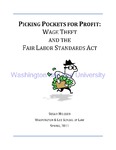| dc.rights.license | In Copyright | en_US |
| dc.creator | Miloser, Susan | |
| dc.date.accessioned | 2013-11-22T18:20:18Z | |
| dc.date.available | 2013-11-22T18:20:18Z | |
| dc.date.created | 2011 | |
| dc.identifier | WLURG38_Miloser_POV_2011_wm | |
| dc.identifier.uri | http://hdl.handle.net/11021/24146 | |
| dc.description | Susan J. Miloser is a member of the Class of 2012 of Washington and Lee University School of Law. | en_US |
| dc.description | Capstone; [FULL-TEXT FREELY AVAILABLE ONLINE] | en_US |
| dc.description.abstract | I will start with a brief history of the FLSA and the purposes for the legislation. I will also outline wage and hour requirements under the FLSA, the remedies available to workers when an employer fails to satisfy those requirements, and whistleblower protections. Next is a subsection entitled: How do Employers Steal Wages? In this section I will highlight the misclassification of employees and some of the other most common ways in which employers steal from workers.
While wage theft occurs at every level of employment, this paper will concentrate on theft from lowwage workers. A section entitled: Who is Most Vulnerable to Wage Theft? will tell the stories of several groups of workers, predominately women and minorities, who often find themselves the victims of some of the most egregious acts of wage theft. In this section, I will briefly bring to light the racialized and genderized history of federal wage and hour legislation. I will show that a binary system of wage protection continues to exist that leaves certain populations particularly susceptible to wage and hour violations and, at the same time, allows exploitative employers to prosper -- contrary to the purposes of the FLSA. Finally, I will suggest some measures that should be taken in order to combat wage theft, focusing on wage and hour violations that occur among the least protected. [From Introduction] | en_US |
| dc.format.extent | 46 pages | en_US |
| dc.language.iso | en_US | en_US |
| dc.rights | This material is made available for use in research, teaching, and private study, pursuant to U.S. Copyright law. The user assumes full responsibility for any use of the materials, including but not limited to, infringement of copyright and publication rights of reproduced materials. Any materials used should be fully credited with the source. | en_US |
| dc.rights.uri | http://rightsstatements.org/vocab/InC/1.0/ | en_US |
| dc.subject.other | Washington and Lee University, Shepherd Poverty Program | en_US |
| dc.title | Picking Pockets for Profit: Wage Theft and the Fair Labor Standards Act | en_US |
| dc.type | Text | en_US |
| dcterms.isPartOf | RG38 - Student Papers | |
| dc.rights.holder | Miloser, Susan | |
| dc.subject.fast | Fair Labor Standards Act of 1938 (United States) | en_US |
| dc.subject.fast | Minimum wage | en_US |
| dc.subject.fast | Overtime -- Law and legislation | en_US |
| dc.subject.fast | Piecework | en_US |
| dc.subject.fast | Working poor | en_US |
| local.department | Shepherd Poverty Program | en_US |
| local.scholarshiptype | Capstone | en_US |
